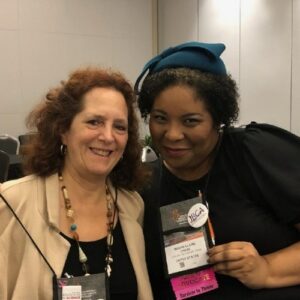Lobular breast cancer advocate Megan-Claire Chase was the recipient of one of the Lobular Breast Cancer Alliance’s (LBCA) travel grants to attend the San Antonio Breast Cancer Symposium last year. This was her first time attending the symposium, and she shared her experiences with LBCA. In her report of her impressions that follows, she also touches on being a member of the often-overlooked population of women under 40 who are diagnosed with lobular breast cancer every year.

I am thrilled that I got to attend the San Antonio Breast Cancer Symposium 2022 (SABCS22) as both a survivor and patient advocate. There’s something empowering, uplifting, and a little overwhelming about being surrounded by all things breast cancer – providers, researchers, pharma, nonprofits, survivors, metastatic patients, and patient advocates. It was my first time going, and I was unsure what to expect.
Aside from looking forward to meeting cancer friends in person, especially those I’ve only known through social media, I couldn’t wait to hear about new research about lobular cancer. Why you may ask? Well, I am a six-year stage IIA invasive lobular breast cancer survivor.
I remember being frustrated with my oncologist about the lack of information about lobular when I was initially diagnosed in September 2015. When I questioned her wanting more detailed information about the differences between ductal and lobular, she gave me vague responses. That’s why I am thrilled and relieved that LBCA exists, and I wish this organization had been around when I was diagnosed.
The vetted information continuously gathered and the cutting-edge research being shared and in some cases funded by the LBCA and support for survivors like me to be able to attend major breast cancer conferences like SABCS22 is critical. LBCA is raising awareness of the unique characteristics of ILC, explaining why it should not be treated like ductal, and bringing attention to the urgent need for more funding for research into this complex subtype. I have become a more informed invasive lobular carcinoma (ILC) patient advocate because of them.
When I heard the presentations of two ILC posters co-authored by LBCA during the final poster session: one titled An international survey on invasive lobular breast cancer (ILC) reveals gaps in knowledge and top priority research areas and the other titled Lobular Breast Cancer Alliance Inc. Survey of Individuals with Metastatic Invasive Lobular Carcinoma (mILC), I finally felt seen and heard as an ILC survivor.
These posters were an essential part of SABC22 because it brought ILC into the spotlight with data that can’t be denied about the need for providers to understand better why ILC is unique and challenging and the need to explain the nuances of it to patients clearly. Plus, both posters highlighted that the lack of information isn’t just a US concern; it is worldwide for those of us in the lobular breast cancer space.
As a lobular survivor, I am constantly worried that a potential recurrence will be missed due to the current imaging available. Are 3D mammograms and MRIs enough for proper surveillance? This was another concern that was highlighted on that specific poster about mILC too. The need to explore new and specific imaging tools was another takeaway from their poster session.
I was also excited to attend the Challenging Types of Breast Cancer educational session. I had my notebook and pen ready when Dr. Sibylle Loibl from the German Breast Group took to the podium to discuss lobular. Some of my excitement was deflated because I didn’t learn anything new about ILC in this session. The presentation seemed more geared toward those who needed a basic understanding of this subtype. I had hoped to hear about new advances and more detailed distinctions of ILC.
There was no focus or research on how ILC affects the young adult (diagnosed under 40) breast cancer community. As someone who was diagnosed under 40, it was disappointing to see zero representation of this often-forgotten community. Nor was there a focus or research on how ILC affects breast cancer patients of color. I wanted to see data on the number of ILC patients across races and ethnicity and those who have never had a child before diagnosis.
What brought some comfort and encouragement was seeing the need for more lobular cancer research spotlighted in the SABCS Year in Review. I look forward to seeing where the research takes the lobular community in 2023 and will keep utilizing LBCA’s website as a guide and reference for updates on new research as they continue to raise a fuss about ILC.

